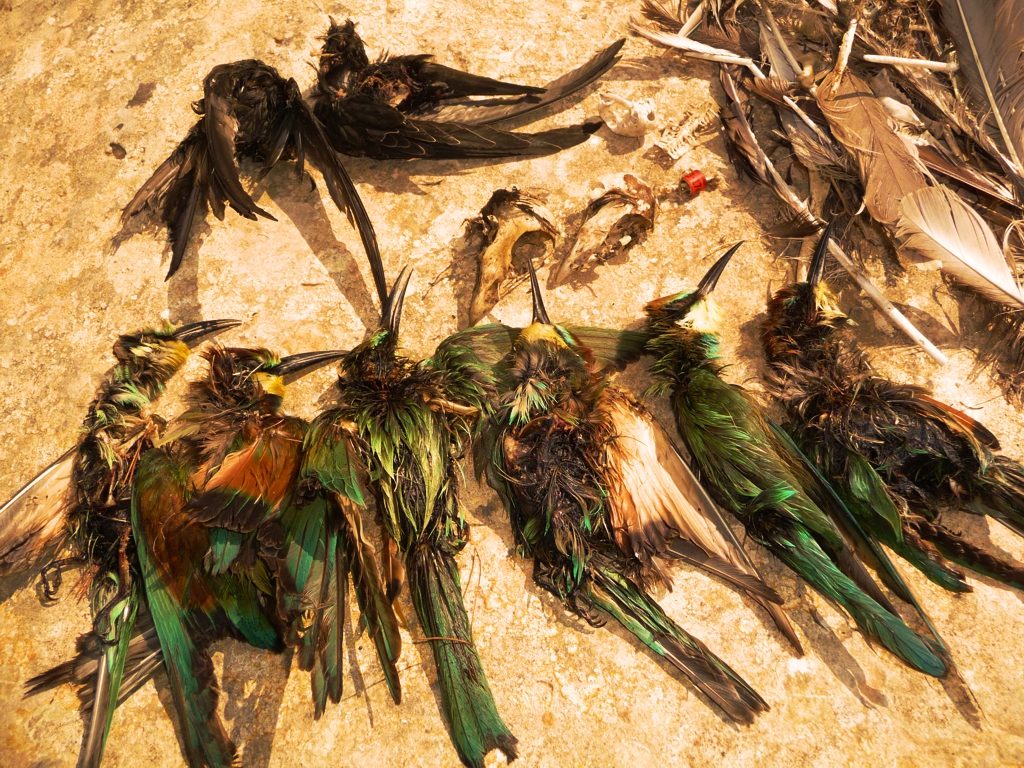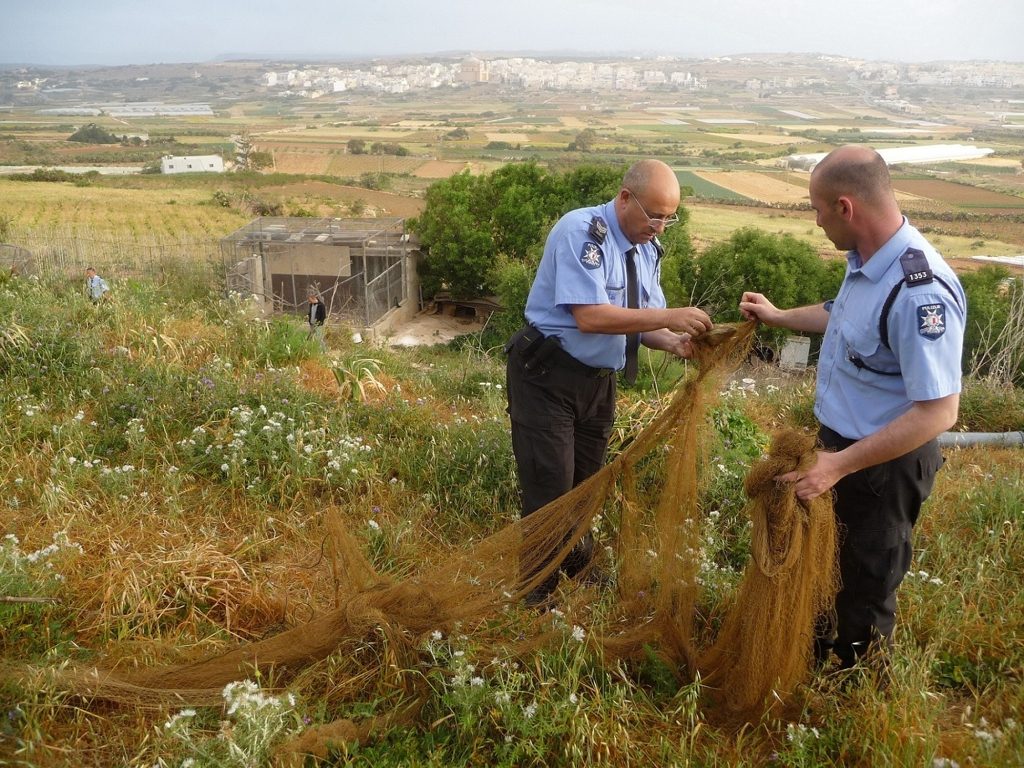
Another referendum on Spring hunting will not resolve Malta’s top conservation conflict.
by Brian Campbell & Diogo Veríssimo
Image: Carcasses of migratory birds discovered by the German NGO Committee Against Bird Slaughter on the Dwejra Lines / International Animal Rescue Malta
[dropcap]O[/dropcap]n the 28th of February, BirdLife Malta (BLM) declared it was considering a second referendum on Spring Hunting. This surprising announcement was a reaction to the Ornis Committee, which advised government to move 2018’s Spring Hunting season back by two weeks. BLM pointed out that the proposed dates coincide with the peak migration period of the Turtle Dove (Streptopelia turtur).
Turtle Dove can no longer be hunted. The current ban was suggested by Hunting Associations as a “sign of goodwill”. But BLM was worried that if the season is pushed to April, hunters will be tempted to shoot Turtle Doves “accidentally”, because the high activity in the countryside will help poachers blend in or escape. The Maltese government, they concluded, was ignoring the “scientific facts” and “bending over backwards” to appease the Hunting Associations, who present themselves as paragons of trust and conservation but have underhandedly found a way around their self-imposed moratorium.
Since Malta is “stuck in medieval times, where the one holding the firearm holds the power”, BLM said a second referendum to ban Spring Hunting is on the cards. The first referendum, held in 2015, resulted in a narrow victory for the pro-Spring Hunting camp, but “a second referendum is more likely to bring a different result as certain mistakes will be avoided”. BLM specified that the confusing wording of the 2015 question “cost the pro-environment lobby a number of votes”.
In this article, we ask whether referenda can solve Malta’s conflict about wildlife (“conservation conflict” from now onwards) and guarantee the long-term survival of endangered biodiversity.
What Is a Referendum, Anyway?
Scholars generally agree that referenda have three defining features. First, they often ask voters deceivingly straightforward “yes-or-no” questions. Second, they are considered to be the purest expressions of democracy, where the will of “the People” is unmediated by petty politicians. Third, referenda transform the issue contested (which, in the case of Spring Hunting is grounded in the technicalities of bird ecology and EU law) into an emotionally-charged moment where a “nation” chooses which values it wants to be seen as having.
Unsurprisingly, the escalation of conservation conflict into something as unwieldy as a national referendum is a scenario conservation scientists generally try to avoid, not bring about. This is because once stakeholders start the path to referendum, their dispute expands beyond conservation. Once these new topics dominate the debate, conservation goals no longer remain the sole drivers of conflict, and can, in fact, become an afterthought. This means that in cases like Malta, where hunting has become a proxy for deeper national anxieties, conservationists are forced to navigate treacherous political contexts, something their training does not prepare them for.
1. Hunting Stops Being about Hunting
For example, in 2015, technical points about conservation were sidelined in favour of arguments about what Malta is and should be. Killing birds for sport, the Coalition Against Spring Hunting (CASH) argued, is incompatible with modern values and embarrasses Malta in front of EU nationals (who boycott touristic visits), EU states (which threaten to fine us), and foreign conservationists (whose work we frustrate). The hunting lobby should not be able to strong-arm parties, dictate policy, and turn democracy into a joke. By contrast, the Hunting Associations presented themselves as guardians of Maltese traditions and insisted Malta should be a country were “minorities” feel protected.
2. The Challenge of Communicating Conservation
When conservationists appeal to the wider public, points based on the complex principles of, say, ecological sustainability or bird population trends, tend to give way to more emotionally appealing messages focused on animal welfare. In Malta, NGOs often diffused harrowing pictures of wounded birds and accounts of “massacres” and “bloodbaths” in the countryside. Hunters were cast as bloodthirsty bullies to be stopped by daring and valiant environmentalists.
Recourse to animal welfare discourse is a double-edged sword for conservationists, whose main focus is on the sustainability of animal populations, not the suffering of individual animals.
Recourse to animal welfare discourse is a double-edged sword for conservationists, whose main focus is on the sustainability of animal populations, not the suffering of individual animals. On the one hand, it gives them excellent opportunities to obtain the support they need to pursue their projects. If not carefully managed, however, it can rob them of important political options. If one’s mission is to stop suffering, then any agreement allowing hunters to kill any number of birds must be temporary lest it becomes a form of surrender. Hunters, moreover, are unlikely to negotiate with anyone seeking their complete extinction.
3. Polarisation, Amnesia and the Naturalisation of Conflict
In 2015, we were surprised by how quickly the wide spectrum of ideologies held by Malta’s many environmental NGOs crystallised into two exclusive positions. As experiences of shared projects, activities and sympathies were forgotten, the zero-sum scenario currently characterizing the hunting arena became entrenched as natural and inevitable.
Polarisation is a major obstacle to conservation, because the intense rivalry it generates prevents these camps from seeing (or recognising) any interests and values they might hold in common. Anti and pro hunting activists might hold similar views about issues such as urban development. Calls for them to work together in greater coalitions to protect encroachment into Outside Development Zones (ODZs) might well represent those few opportunities left for reconciliation, which is essential if conservation is to succeed.
4. Agonism
The problem is that the longer Malta’s hunting arena remains polarized, the less likely reconciliation will occur. Over the past decade, the pro and anti hunting camps have developed a contentious history of nasty (and sometimes violent) encounters that only served to worsen how they view each other. Their grudge-laden, vengeance-driven, trust-deprived rivalry did not go away after the referendum: it only got deeper.
The situation becomes especially alarming when camps start treating their rivals’ every move—including “gestures of goodwill” with total suspicion, believed to be ruses that hide ulterior motives. Just as disheartening for conservation is stakeholders’ inability to even agree on basic facts and statistics. Anti-hunting activists accuse governmental organizations of keeping data on hunting “under wraps” and uncooperative Hunting Associations of harboring poachers. Hunters, similarly, say that “BirdLIES” “spuriously” misread scientific data and use evidence of poaching (e.g. recovered carcasses, video recordings) as propaganda tools instead of handing them to the police. Some hunters also firmly believe that anti-hunting activists “plant” carcasses of protected birds in the countryside and “discover” them in “strategic” moments, such as right before the opening of a hunting season.
Conservationists are already aware that where conservation conflict involves issues of identity, losers are unlikely to concede defeat.
A second referendum would further entrench these camps. Conservationists are already aware that where conservation conflict involves issues of identity, losers are unlikely to concede defeat. But in cases like Malta, where the 2015 referendum was so narrowly lost, it is common for losers to blame defeat on politicians who might have tipped or mislead undecided voters towards one camp or worded the referendum question in a way that confused some voters, interfered with the “People’s” voice, and thus invalidated the referendum. As we have recently seen in Scotland or Britain, rather than being the final word, referenda can provide fertile ground for all sorts of protests that can lead to calls for a second round, but this time for real and “without mistakes” as BLM put it.
5. What about Poaching?

It is unclear how a referendum to ban Spring Hunting will solve the underlying problem of poaching. In effect, we hold that proper conservation cannot be successful without a clearer understanding of who poaches and why.
This understanding still eludes us. The explanation often found in anti-hunting discourse is that hunters are predisposed to violence and will shoot anything if they are not watched or threatened with punishment. The idea that hunters are all closeted poachers cannot be expected to inspire any respect towards and from hunters. Worse still, such a simplistic attitude prevents NGOs from considering that poaching is often a very politically meaningful act that could constitute a form of protest against environmental NGOs, who ignore hunters’ knowledge and portray them as savages who must be tightly monitored.
Reducing poaching through punishment does not mark a victory. It is entirely possible that this repression can create further retaliatory poaching, which in turn creates a need for tighter security and a vicious cycle of repression-and-protest.
However, we think that stopping poaching by further intensifying surveillance along quasi-military lines—with “Bird Guards” launching “operations” to “patrol” and “sweep” the “battlefield”, “ambush” hunters and “set up perimeters” around roosting birds—does not merit the triumphalist tone with which it is so often reported. Reducing poaching through punishment does not mark a victory. In the Maltese case, it can even be considered a sign that conservation does not have broad societal support, and needs an expensive repressive apparatus to work. It is entirely possible that this repression can create further retaliatory poaching, which in turn creates a need for tighter security and a vicious cycle of repression-and-protest.
Beyond Referenda
Everything points to the fact that a referendum on Spring hunting will not resolve Malta’s top conservation conflict. Victory for the anti-hunting camp could help restore credibility to their claim of representing, if not “the People”, then at least a majority of them. This confidence could help environmental NGOs in their important struggles elsewhere. But it will not automatically translate into a victory for conservation. Probably, it will simply make it easier for environmental activists to catch poachers by criminalising all those who descend to their fields with a gun.
Instead of pursuing referenda or throwing lawsuits at each other, stakeholders should become better acquainted with the dynamics of conflict, so they can help manage it instead of being swept by it. They should also try to recover the shared values, identify goals and interests from which essential processes of reconciliation could commence, remembering all the while that there cannot be conservation without conversation.
![]()
 Dr. Brian Campbell is a Research Fellow at the Max Planck Institute for Social Anthropology. He has conducted extensive ethnographic fieldwork on migration and multiculturalism (convivencia) in the Spanish Enclave of Ceuta. He is also interested in the politics of wildlife conservation, focusing on the conflict between bird-hunters and Environmental Non-Governmental Organisations in Malta.
Dr. Brian Campbell is a Research Fellow at the Max Planck Institute for Social Anthropology. He has conducted extensive ethnographic fieldwork on migration and multiculturalism (convivencia) in the Spanish Enclave of Ceuta. He is also interested in the politics of wildlife conservation, focusing on the conflict between bird-hunters and Environmental Non-Governmental Organisations in Malta.

Dr. Diogo Veríssimo is an Oxford Martin Fellow at the University of Oxford, UK, where he works on the design and evaluation of interventions to influence human behavior towards biodiversity. Learn about about his work at www.diogoverissimo.com.

A very detailed and logical article; undoubtedly based on much thought and analysis. However, it just misses a fundamental fact, namely hunting is not the only issue that creates polarisation in the Maltese society, any two issues in fact would do, you name it Politics, football – Italians v English, even within the small Maltese villages, clearly manifested by the antagonism between supporters of patron saints, and between those belonging to the same saint, rivalry sprouts out between band clubs. I’m sure this is very intriguing to the sociologist. Another pertinent point to mention is the other referendum, i.e. that of accession where the Maltese hunter was given unequivocal guarantees that nothing will change post accession, so the Maltese actually voted twice in two seperate refetenda for Spring hunting. One musn’t neither forget the ECJ’s decision upholding Malta’s right to derogate for Spring Hunting. I’m sure that as a sociologist you would also be interested in how this whole persecution is affecting the well being of thousands of Maltese and their families. Important for me to declare the fact that I am a hunter and clearly I cannot claim objectivity, so I try to stick to the undeniable facts.
This must be one of the best analyses of the situation on this issue. Balanced views such as this are hard to come by and therefore precious. Thank you for this article (and the work behind it).